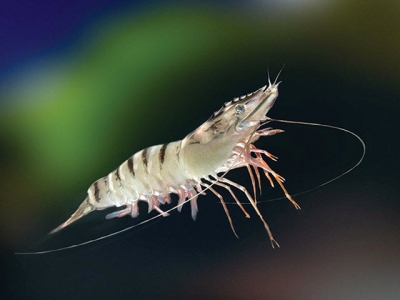Effects of polychaetes on sperm performance of the domesticated black tiger shrimp

Sand polychaetes (Perinereis nuntia) have been used as a live feed to boost reproductive maturation before mating in hatchery farms in Thailand. However, no study has evaluated the effect of polychaetes on performance and physiology of the sperm of the domesticated black tiger shrimp (Penaues monodon), writes Nitsara Karoonuthaisiri et al, Microarray Laboratory, National Center for Genetic Engineering and Biotechnology (BIOTEC), Thailand.
Therefore, this study aims to study the effects of sand polychaetes on growth, survival, reproductive performance and sperm physiology and morphology of domesticated male broodstock P. monodon.
After feeding with either polychaetes or commercial pellets for four weeks, growth and survival rates of polychaete-fed group were significantly higher than those of pellet-fed group. Spermatophore weight and total sperm counts of the polychaete-fed group were significantly higher than those of the pellet-fed group at Weeks 3 and 4, whereas per cent abnormal sperm cells and % acrosome reaction of polychaete-fed group were significantly lower and higher than those of pellet-fed group only at Week 4, respectively.
Physiology of spermatophores in the polychaete-fed group was white and opaque while that of the pellet-fed group was pigmented. Morphological changes of sperm revealed less abnormal sperms (misshaped half, misshaped head, and misshaped tails) in the polychaete-fed group.
Nutritional analysis revealed that polychaetes have significantly higher total protein, fat contents and essential fatty acids (arachidonic and eicosapentaenoic acids) but significantly lower fiber content.
Moreover, histological analysis of hepatopancreas revealed more vacuoles, which are storages for glycogen and lipids in the polychaete-fed group than in the pellet-fed group.
Therefore, this study provides an evidence that polychaetes provide benefits to growth, survival and sperm performance for boosting reproductive maturation in male domesticated broodstock Penaeus monodon.
Có thể bạn quan tâm
 Six tips for water quality management in shrimp farming
Six tips for water quality management in shrimp farming Achieving and maintaining good water quality throughout shrimp production is crucial for long-term success.
 Freshwater shrimp production - Frequently asked questions
Freshwater shrimp production - Frequently asked questions This article provides answers to a number of frequently asked questions regards the cultivation of freshwater prawns in ponds
 Management of intensive Vannamei shrimp ponds
Management of intensive Vannamei shrimp ponds How to manage Vannamei shrimp ponds with high stocking density and no water exchange in relation to growth, survival and water quality.